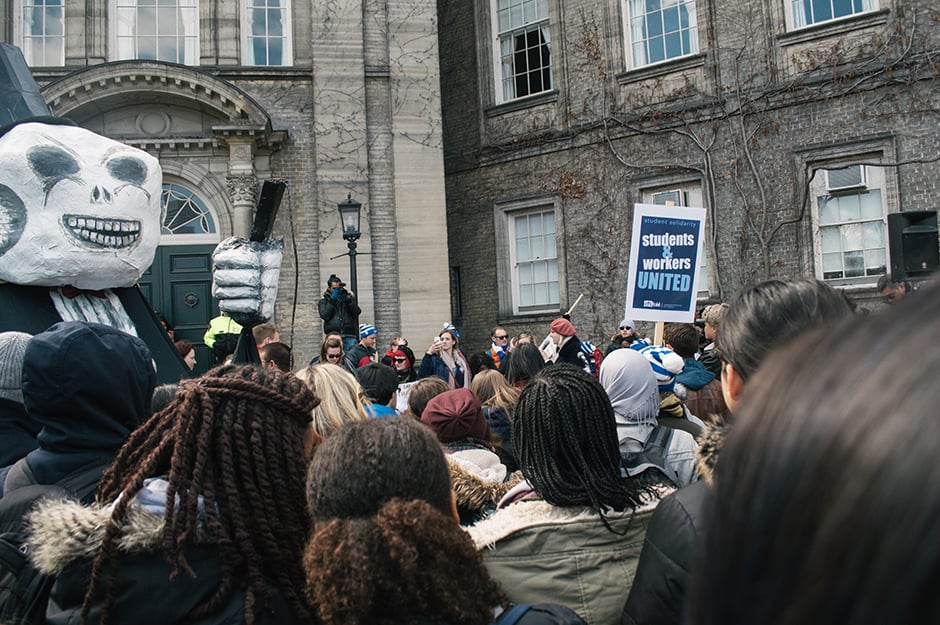The University of Toronto Students’ Union (UTSU) recently endorsed a campus-wide walkout, which occurred last Wednesday, in order to “pressure U of T into ending the strike and refunding our fees.” The UTSU, as well as many professors, university departments, and notable public figures, should be commended for their solidarity with the TAs. Their actions add growing pressure on the university to return to the negotiating table and recognize the TAs’ dire working conditions.
Yet, many students have exploited the walkout event as an opportunity to attack the UTSU for its history of poor student governance. For instance, one student posted on the walkout event page: “Petition to have an UTSU fee refund instead.” A separate post accused the UTSU of not communicating adequately with its constituents, saying: “If the UTSU wants to criticize the University Administration, they could start by setting a good example themselves.” The thread of comments eventually devolved into a flame war, in which the UTSU was further criticized as being “a disgrace to the University and has been since literally before the Second World War.”
Apparently, the UTSU was not adequately representing students by unilaterally supporting the strike and encouraging “childish” organization techniques. For several reasons, these opinions are most likely motivated by dogmatic anti-UTSU sentiments, rather than sincere worries over democratic governance or effective activism.
First, in no way did the UTSU impose this event on students, nor on the professors that cancelled class in solidarity with the walkout. If you disagreed with their tactics, you were under no obligation to attend.
Second, several other student unions — such as the Philosophy Course Union and Women and Gender Studies Student Union — have openly supported the TAs. The Arts and Science Students’ Union has been especially vocal in defending the strike, and also specifically endorsed the walk out. Funnily enough, I have yet to see such concerted antagonism directed at them.
Third, walkouts as an act of protest have been successful historically. Students in Québec have a long tradition of striking in order to freeze tuition fees. It is thus completely logical that student unions would endorse the walkout in order to convey significant discontent to the administration. What’s more, the UTSU has been engaged in a variety of other advocacy techniques in support of the TAs, including co-hosting an undergraduate town hall and promoting petitions to the administration. The criticism focused solely on the walkout, then, is incredibly myopic.
Undoubtedly, there are genuine and serious concerns regarding the democratic integrity of the UTSU’s governance. Having said that, the UTSU governance can and should be evaluated independently of the more urgent problems at hand — namely, the legitimacy of the TAs’ grievances; the U of T administration has been negotiating in bad faith, and we have been short-changed out of our increasingly expensive post-secondary education. In this context, anti-UTSU rhetoric simply derails the conversation from the bigger picture.
As The Varsity’s editorial board pointed out a few weeks ago, the TA dispute is but one disturbing consequence of steadily decreasing public funding for post-secondary education in Canada. As universities turn to corporate strategy and rely increasingly on inadequately compensated part-time staff, our education is becoming compromised. Classes are getting bigger, instructors are overworked, and we are forced to learn in decrepit buildings.
Consequently, it is disappointing that some students are blindsided by student politics — we are struggling to present a common front in face of these larger issues. I wholly support holding the UTSU accountable for its misconduct and engaging vigorously with campus governance, especially with executive elections this week. But debates on the UTSU shouldn’t divide us when we are confronted with broader, nationwide problems, which will require student unity now more than ever.
Victoria Wicks is an associate comment editor at The Varsity. She is a second-year student at Trinity College studying political science and philosophy. Her column appears bi-weekly.


